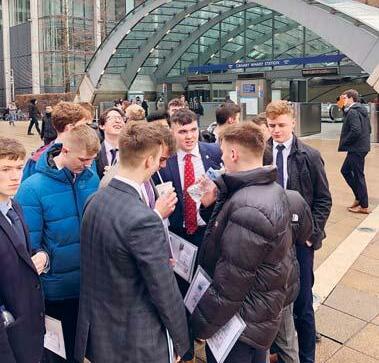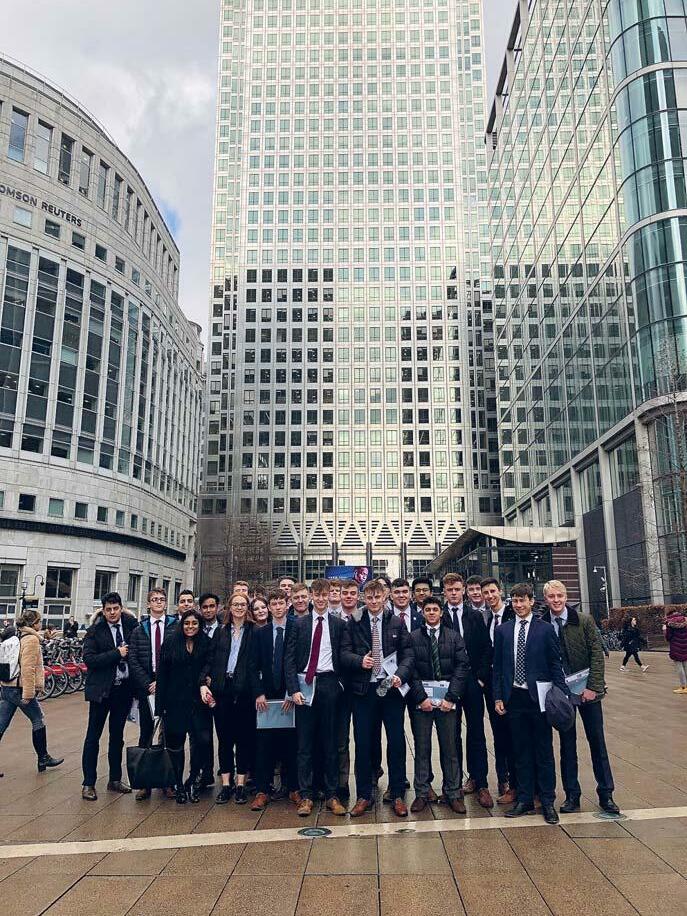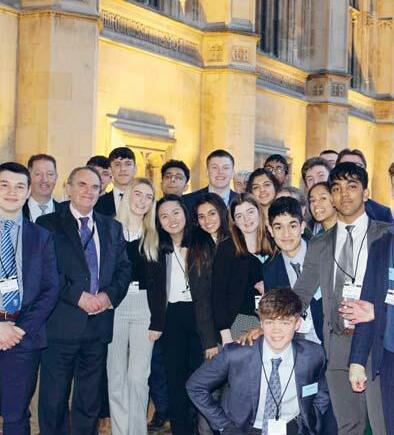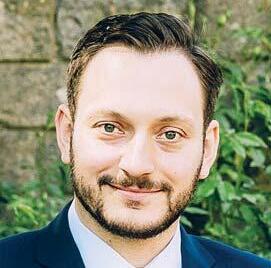
7 minute read
REFLECTIONS ROGER LOXLEY
REFLECTIONS
BY ROGER LOXLEY FORMER HEAD OF ECONOMICS AT RGS
Advertisement
2022 marks the 60th Anniversary of the RGS Economics Department, and it is also the year that Roger Loxley, former Head of Economics, will retire from his role as Deputy Head (Academic). Roger will stay on the RGS staff, continuing to teach Economics. Here, he reflects on his time at RGS and especially the Economics Trips to London.

When did the first tour happen?
I arrived at RGS in 1995 fresh from a PGCE and a ten-year career in banking and finance. As such I was still very much in contact with my old colleagues at HSBC. I was also very interested in learning in a real-world context and keen to use the contacts I had for the benefit of the students. I was aware that the department had run a tour to London in the past so Jon Punshon and I decided to put together an itinerary to re-launch the Tour. We went south in March 1996 with a handful of students in a minibus.
Why did you do it?
I’d always been keen to take students out of school. I did it during my PGCE in central London where I took 24 Y8 students to St Paul’s cathedral to study circles (I was teaching a bit of maths at the time). They loved it and it really brought the topic to life. I also took my L6 students to the Job Centre to look at the realities of unemployment, both in London and at RGS. So, to travel to London to visit banks and hear from industry experts was a bit of a no-brainer. It brings the subject to life and has the added benefit of making sometimes sceptical students realise that their teachers do know what they’re talking about!

How did you pick the hosts and where to go?
I had a good list of contacts and so did Jon so we pooled our resources. I think we went to HSBC, James Capel, CitiBank and a couple of other institutions to hear from top people. Over time, we’ve blatantly abused our list of contacts and as a result we’ve had talks from some seriously impressive people including the early days of Steven King’s tenure at HSBC (he went on to be Chief Economist), Darshini David (now on the Today programme as Economics correspondent), Martin Weale (Economics guru and ex-MPC member), Gus O’Donnell at the Treasury and most recently David Smith from The Times. These are big names and for our students to hear from them is a wonderful opportunity. But, and this is really important to me, it’s not just hearing from them but being able to ask them questions that makes the difference. They come across as people as a result and that’s what sticks in the memory.
What were the objectives and how did they change over time?
The main aim was to give the students an experience they would not forget. That meant the tour had to be seriously informative and the quality of the talks had to be top-notch. The few times we’ve had duff talks are when we’ve been subject to the standard “school talk” at places like the Bank of England or the Treasury. These are well-meaning and designed by the Education Department of the organisation and aimed at school kids. But I’ve always thought of RGS students as better than that, as proper Economists and thus able to cope with much more complex language and ideas. That’s what sticks with the students. It also is what makes the speakers come back year after year. The students’ questions show them to be fearless and inquisitive and not interested in making themselves look good (as tends to be the case in more corporate settings). But it was also really important that the tour was fun and gave the students a real flavour of London. Being an ex-pat myself and a North East immigrant from the South, I really wanted to encourage our students to see London, go and work there at the start of their careers and then come back to the North East bringing their human capital with them.
How has the tour changed over time?
The talks haven’t changed – and some of the speakers won’t like being reminded that they’ve been doing them for more than 20 years in some cases! We still seek out industry experts and people we know through our various networks. That makes the tour fairly stable in who we visit. Not a bad thing, but it does mean that we haven’t diversified much. What has changed immeasurably is what we can get away with. It’s been 27 years since the first tour I did and what we did then we would certainly not be able to do now. At its height the tour used to go for three nights and we’d give students the last night off on their own to explore the West End. That couldn’t happen now. So the tour is down to one night where we can keep the students under our direct supervision for most of the time. That’s changed it, of course, and we’ve lost the late night long chats with students over a beer or two. I think that’s a shame but times change, as they say. At the instigation of Susan Beck in the RGS Development Team we do now have a wonderful evening in the House of Lords courtesy of the kindness of Lord Timothy Kirkhope (53-62) and we get to see lots of ONs there to do some great networking and casual inspiration.
How do you think the tour has affected those who went on it?
I hope that the tour has had a lasting impact on those that went. It won’t be everyone’s cup of tea and some will have found it less useful. But I know that there were some, if not many, for whom it was a bit of a life-changer and if I can provide that opportunity for young people then I’m doing my job. At the very least I hope it was a school trip that all students can look back on as fun and enjoyable.
What were your favourite memories?
I have too many to mention, and some that I simply can’t discuss in 2022! But the fondest memories are of some truly wonderful conversations with students: in the street whilst walking to or from a talk, in the bar of the hotel discussing life and possible career choices, on the train enjoying some lighthearted fun – mostly at Jon Neil’s (Staff from 2000) expense. But also some great talks – David Mackie has always been a highlight for me, a man of great intellect and a true enthusiast for his subject. But also the amazing willingness that makes the speakers come back time and time again. To set the tour up can take as little as ten minutes – half a dozen emails with some quick replies and it’s done.
How will the tour carry on once you’ve retired?
I honestly have no idea. I’ve been running it for over 20 years now since Jon and then Geoff Riley left so it’s my contacts and, to an extent, my tour. I hope it can continue; it’s got to be bigger than me.
Some Old Novos share some of their memories of the famous RGS Economics Trips to London:

Jeff Ball (95-02) (Above) The Tour was what made Economics “click” for me. Before that I struggled to understand the theory but by seeing it in practice at these leading financial institutions, it all started to make sense. It gave me the confidence to complete a Master’s degree in International Economics and Finance at Newcastle and that helped me find a role at FTSE 250-listed wealth manager, Brewin Dolphin, where I am now a Director within the Investment Management team.
Nicholas Fawcett (93-00) I owe my career to the RGS Economics tour. It’s hard to overstate the inspiration of seeing people live and breathe what we had been studying in the classroom. It gave me career advice (from a Treasury official who went on to head the civil service), a future boss I ended up working with at the Bank of England, and a network from which I have sought advice many times over the past twenty years. I will always be grateful to the RGS economics teachers for their commitment to it.
Kieran Houston (96-03) The tour made me realise the extent of the privilege we all had as RGS students (or maybe just students of you!) to have that type of opportunity. It made me sure I definitely didn’t want to work in finance or banking!
Richard Cahill (87-98) I remember the Economics trip which was a great way to see the immense relevance of what we were studying and the teachers brought boundless energy to the trip, meaning it was filled with lots of great meetings.










